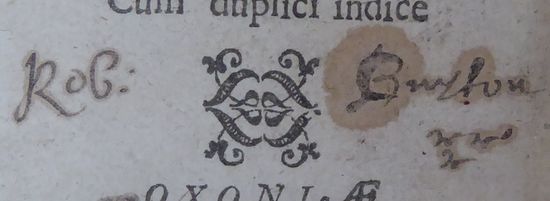Difference between revisions of "Robert Burton 1577-1640"
m (Text replacement - "education::Christ Church College, Oxford " to "education::Christ Church, Oxford ") |
|||
| (4 intermediate revisions by 3 users not shown) | |||
| Line 3: | Line 3: | ||
====Biographical Note==== | ====Biographical Note==== | ||
| − | Born at [[place of birth::Lindley Hall, Leicestershire]], second son of a country gentleman, [[family::Ralph Burton]] ( | + | Born at [[place of birth::Lindley Hall, Leicestershire]], second son of a country gentleman, [[family::Ralph Burton]] (1547-1619), and younger brother of the [[occupation::antiquary]] [[crossreference::William Burton 1575-1645|William Burton]]. Matriculated at [[education::Brasenose College, Oxford]] 1593, moved to [[education::Christ Church, Oxford]] where he graduated BA 1602 (MA 1605, BD 1614). Spent the rest of his life resident in [[location::Oxford]], as a Student of [[education::Christ Church, Oxford|Christ Church]]; held a number of ecclesiastical livings, including being [[occupation::vicar|Vicar]] of [[location::St. Thomas’s, Oxford]], 1616-40. Principally celebrated as the author of [[book title::''The anatomy of melancholy'']], first published in [[date of publication::1621]], which went through eight editions in the 17th century. |
====Books==== | ====Books==== | ||
| − | Burton’s library is well documented, and most of the 1740 books he is known to have possessed survive today. Kiessling’s study shows that he acquired books throughout his life, both new and secondhand, with the content analysed as: 24% [[subject::theology]], 20% [[subject::literature]], 16% [[subject::history]], 9% [[subject::medicine]], 6% [[subject::government]], 5% [[subject::geography]] or travel, and the remainder a wide mix of subjects including [[subject::law]], [[subject::philosophy]], [[subject::agriculture]], [[subject::science]], [[subject::mathematics]] and marvels. Most of them seem to have been in simple, plain bindings. Burton [[bequest::bequeathed]] the bulk of his collection to be divided between the [[beneficiary::Bodleian Library]] and [[beneficiary::Christ Church | + | Burton’s library is well documented, and most of the 1740 books he is known to have possessed survive today. Kiessling’s study shows that he acquired books throughout his life, both new and secondhand, with the content analysed as: 24% [[subject::theology]], 20% [[subject::literature]], 16% [[subject::history]], 9% [[subject::medicine]], 6% [[subject::government]], 5% [[subject::geography]] or travel, and the remainder a wide mix of subjects including [[subject::law]], [[subject::philosophy]], [[subject::agriculture]], [[subject::science]], [[subject::mathematics]] and marvels. Most of them seem to have been in simple, plain bindings. Burton [[bequest::bequeathed]] the bulk of his collection to be divided between the [[beneficiary::Bodleian Library]] and [[beneficiary::Christ Church, Oxford|Christ Church]], the former having first choice. 750 volumes were selected for the [[organisations::Bodleian Library|Bodleian]], including much [[language::English]] and [[subject::literature|literary material]], with 780 going to [[beneficiary::Christ Church, Oxford|Christ Church]]. He also [[bequest::bequeathed]] [[monetary value::£100]] to [[beneficiary::Bodleian Library|the Bodleian]]. Examples: numerous in the two main beneficiary libraries; British Library C.30.d.28; Durham University Library GHCC.C01A. |
| − | + | [[file:P1280819(1).JPG|thumb|550px|Burton's inscription, from the titlepage of Salvianus, ''De gubernatione dei'', 1629, British Library Ames 3/857]] | |
====Characteristic Markings==== | ====Characteristic Markings==== | ||
Regularly wrote a cipher of 3 r’s and his name, in various forms from R B to Robertus Burton[us], on titlepages; sometimes added the date of acquisition or the price paid. About a fifth of his books are further annotated on flyleaves or within the text. | Regularly wrote a cipher of 3 r’s and his name, in various forms from R B to Robertus Burton[us], on titlepages; sometimes added the date of acquisition or the price paid. About a fifth of his books are further annotated on flyleaves or within the text. | ||
Latest revision as of 04:10, 26 June 2022
Robert BURTON 1577-1640
Biographical Note
Born at Lindley Hall, Leicestershire, second son of a country gentleman, Ralph Burton (1547-1619), and younger brother of the antiquary William Burton. Matriculated at Brasenose College, Oxford 1593, moved to Christ Church, Oxford where he graduated BA 1602 (MA 1605, BD 1614). Spent the rest of his life resident in Oxford, as a Student of Christ Church; held a number of ecclesiastical livings, including being Vicar of St. Thomas’s, Oxford, 1616-40. Principally celebrated as the author of The anatomy of melancholy, first published in 1621, which went through eight editions in the 17th century.
Books
Burton’s library is well documented, and most of the 1740 books he is known to have possessed survive today. Kiessling’s study shows that he acquired books throughout his life, both new and secondhand, with the content analysed as: 24% theology, 20% literature, 16% history, 9% medicine, 6% government, 5% geography or travel, and the remainder a wide mix of subjects including law, philosophy, agriculture, science, mathematics and marvels. Most of them seem to have been in simple, plain bindings. Burton bequeathed the bulk of his collection to be divided between the Bodleian Library and Christ Church, the former having first choice. 750 volumes were selected for the Bodleian, including much English and literary material, with 780 going to Christ Church. He also bequeathed £100 to the Bodleian. Examples: numerous in the two main beneficiary libraries; British Library C.30.d.28; Durham University Library GHCC.C01A.
Characteristic Markings
Regularly wrote a cipher of 3 r’s and his name, in various forms from R B to Robertus Burton[us], on titlepages; sometimes added the date of acquisition or the price paid. About a fifth of his books are further annotated on flyleaves or within the text.
Sources
- Material Evidence in Incunabula.
- Robert Burton, Catalogue of English Literary Manuscripts 1450-1700.
- Bamborough, J. B. "Burton, Robert (1577–1640), writer." Oxford Dictionary of National Biography.
- Erne, L. Shakespeare and the book trade, 2013, 210.
- Kiessling, N. The Library of Robert Burton: addenda and corrigenda, Notes &Queries 258 (2013), 523-6.
- Kiessling, N. The library of Robert Burton: new discoveries, The Book Collector 45 (1996), 172-79.
- Kiessling, N. The legacy of Democritus junior, Oxford, 1990.
- Kiessling, N. The library of Robert Burton, Oxford, 1988
- Macray, W. D. Annals of the Bodleian Library. 2nd edn, Oxford, 1890.90-93.
